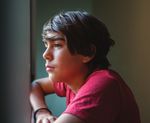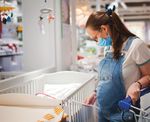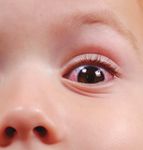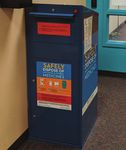Anxiety Disorders Are Common and Treatable - Seattle ...
←
→
Page content transcription
If your browser does not render page correctly, please read the page content below
A Seattle Children’s Publication | Fall 2021
Anxiety Disorders Are Common and Treatable
Anxiety is a normal emotion. However, for some events, and activities they once enjoyed. If
kids, it’s a too-big, too-frequent feeling that untreated, this can cause them to become
affects their overall happiness — and sometimes, withdrawn and depressed.
even their ability to function. Anxiety disorders There is no single cause of anxiety disorders.
are the most common mental health disorders Some children seem to have an anxious nature
among children and teens. from birth. Often, kids with anxiety disorders
The symptoms vary from child to child. have parents or other family members who
One common symptom is fear centered also have excess anxiety. In any case, it’s
around parents or caregivers, such as being nobody’s fault.
Sometimes, in trying to help their child
away from them, or fearing they’ll die. Kids
cope, parents and caregivers unknowingly
may fear being embarrassed or making
model fearful behavior that can amp up their
mistakes in social situations. They may worry
child’s symptoms rather than ease them. So, if
a lot about everyday events like tests or sports dizziness, and quick breathing. When they you suspect your child has an anxiety disorder,
contests, or huge events like global warming. happen frequently, these feelings can seek expert help right away. Research shows
Sometimes, they fixate on dirt or germs, or interfere with our lives and disrupt our sleep that the treatment that helps the most is
develop a specific phobia. These are just some and appetite — and may even be mistaken as cognitive behavioral therapy (CBT), which
of many possible symptoms. symptoms of a physical illness. focuses on exposures or facing one’s fears.
We feel anxiety in our bodies in the form Understandably, excess anxiety can lead a Ideally, caregivers are active participants in
of headaches, stomachaches, racing heart, child to avoid situations like school, social this treatment; for young children, the medical
expert may work just with the parents.
Your child’s doctor may be able to help you
find resources or providers that specialize in
this treatment. And in addition to CBT, there
Safely Dispose of Unwanted and Expired Medicines are many free resources available online or via
One way to prevent unintentional ingestion of medicine and apps to help get you started.
medicine misuse is by safely disposing of medicines that you no Let your child know that together, you’ll do
longer need as soon as possible. Drop-boxes are located whatever’s needed to overcome this challenge.
throughout Washington at participating retail pharmacies, Anxiety disorders are not lifetime disorders
hospital and clinic pharmacies and law enforcement offices. — this problem is changeable. With some help,
Most prescription and over-the-counter medicines are accepted. anxiety won’t be calling the shots in their life
anymore!
to learn more:
Visit takebackyourmeds.org to find a drop-box near you.
to learn more:
Visit seattlechildrens.org/pdf/pe1492.pdf.Beware of Dangerous Infant Sleep Products
The Consumer Product Safety Commission has said a loophole by removing the word ‘sleep’ from their
it will stop companies from selling infant sleep product names — and then continue to market them.
products that do not meet sleep-safety standards. To see whether a product has been recalled or is
These unsafe products include infant hammocks, linked to injuries, go to www.SaferProducts.gov.
in-bed sleepers, and inclined sleepers. Tragically, these To learn more, watch the ‘Safe Sleep for Your Baby’
types of products have been linked to more than 100 video using the link below.
infant deaths. Unfortunately, this mandate does not
go into effect until next year, and some companies that to learn more:
produce these unsafe products may take advantage of Visit tinyurl.com/uzedzkbs.
Pinkeye: Causes, Symptoms, Prevention and Treatment
Conjunctivitis, better known as pinkeye, is a and sneezes help prevent the spread of pinkeye. If
common eye infection. It can be caused by the same you think your child has it, see their healthcare
viruses and bacteria that result in colds and other provider to determine if treatment is needed. Viral
infections. Pinkeye can spread through coughing pinkeye usually goes away without any treatment,
and sneezing, by touching an infected person, or by while the bacterial type is treated with antibiotic eye
touching something an infected person has touched. drops or ointment. Pinkeye that’s caused by allergies
Not surprisingly, it can sweep through daycares and or by irritants (like chlorine or smoke) is not
schools. Besides the red or pink color, eye discomfort contagious, but treatment can ease the symptoms.
is also a symptom — including itchiness and a gritty
feeling under the eyelids. There may also be a goopy to learn more:
discharge, along with swollen eyelids and sensitivity Visit seattlechildrens.org/conditions/a-z/eye-red-
to bright light. Handwashing and covering coughs without-pus.
Preventing Flu and COVID-19
COVID has dominated news headlines for many It’s safe to get both vaccines at the same
months, but it’s not the only health threat out time. If you have questions about any vaccine,
there. The seasonal flu is also heading our way. ask your doctor.
We must all take action to prevent getting sick The super-contagious COVID delta
from these contagious — and potentially variant is surging and is causing severe
dangerous — viruses. illness for some unvaccinated children and
To prevent the seasonal flu, everyone 6 adults. To protect our kids and ourselves,
months and older should get the flu vaccine every even fully vaccinated people should mask up,
year. It’s reformulated each year to protect against avoid crowds, and practice social distancing.
the flu viruses that science predicts will be most this newsletter was published, a vaccine for And to help prevent both the seasonal flu
common that flu season. It takes about two weeks children ages 5 to 11 was expected in early to and COVID, we should always practice the
for the flu vaccine to protect us from the flu, so midwinter — possibly sooner. For those basics: wash hands frequently, stay home
aim for you and family to get the vaccine by the under 5, it’s expected sometime in 2022.) when sick, and avoid others who are sick.
end of October. People are fully vaccinated two weeks after
To prevent COVID-19, everyone who is their second shot of the two-dose Pfizer or to learn more:
eligible should get the COVID vaccine, which is Moderna vaccines, and two weeks after the Visit cdc.gov/flu/symptoms/flu-vs-covid19.
now available for ages 12 and older. (At the time single-shot Johnson & Johnson vaccine. htm.Kid Bits
Growth-Plate Injuries Picky Eaters Pedestrian Safety for Kids
Children and teens have patches of growing It’s common for toddlers to become picky As pedestrians, children are more apt to be
tissue near the ends of their long bones. These eaters, or to have less of an appetite than when injured than adults and older teens — mostly
areas are called growth plates, and they they were younger. It’s also common for parents because of their smaller size and lack of brain
determine how long a child’s bones will be to worry that their child isn’t getting the nutrition development. As you go about your daily
once they are fully grown. When kids break they need — and pediatricians do a lot of activities, talk with your child about how to be
bones, they may also damage their growth reassuring on this topic! Indeed, these changes in safe around traffic. Point out the sounds and
plates. This can cause the bone to stop growing eating habits and appetite are normal. Keep sights of moving vehicles and help your child
or to grow unevenly. Most growth-plate offering your toddler healthy choices and keep tune in to them. Be sure they understand that
fractures occur in the long bones of the fingers, introducing new foods — bearing in mind that drivers often can’t see them — especially when
forearms, and lower legs. Since growth plates they may need to be offered a new food as many their vehicle is backing up. Since young kids
can’t be seen on an X-ray, a child may need an as 10 to 15 times before they will eat it. Don’t can’t judge the distance and speed of vehicles,
MRI or other scan to check for growth-plate force or pressure your child to eat, and don’t keep don’t let children younger than 10 cross the
damage. To avoid long-term problems, it’s them in their highchair if they’re clearly not street alone or go into it to retrieve a ball. Be a
important to see a doctor who specializes in interested in eating. If you’re worried or have strong role model by removing earbuds, using
growth-plate injuries in children and teens. specific concerns, talk with your child’s doctor. crosswalks, and always looking left, right, and
left again before crossing.
to learn more: to learn more:
Visit seattlechildrens.org/conditions/ Visit zerotothree.org/resources/1072-how- to learn more:
fractures. to-handle-picky-eaters. Visit safekids.org/walkingsafelytips.
Quick Tip Regional Clinic Locations
• Bellevue
• Everett
• Olympia
• Tri-Cities
Online Resources
Visit seattlechildrens.org for the following:
• Child Health Advice
Check that you have a working • Federal Way • Wenatchee • my Good Growing email newsletter
• Doctor Finder
smoke alarm inside each Primary Care Clinic • On The Pulse and Autism blogs
bedroom, outside each sleeping • Odessa Brown Children’s Clinic • Medical condition information
area and on every level of your • Health & safety information
Main Hospital Numbers
home, including the basement. 206-987-2000 • Ways to help Seattle Children’s
Change batteries once a year. 866-987-2000 (Toll-free) • Research Institute information
facebook.com/seattlechildrens
Heather Cooper is the Editor of Good Growing, which is produced four times a year by the Marketing Communi-
cations Department of Seattle Children’s. You can find Good Growing in the January, April, July and October
instagram.com/seattlechildrens issues of ParentMap and on our website seattlechildrens.org. For permission to reprint articles for non-
commercial purposes or to receive Good Growing in an alternate format, call 206-987-5323. The inclusion of any
resource or website does not imply endorsement. Your child’s needs are unique. Before you act or rely upon
twitter.com/seattlechildren
information, please talk with your child’s healthcare provider. © 2021 Seattle Children’s, Seattle, Washington.
youtube.com/seattlechildrensClasses and Events
As the COVID-19 situation changes, we continue to adjust or postpone our classes and events to follow public
health recommendations. We now offer some classes online while some are on pause. Please check our website
for the latest information. Scholarships are available. If you would like to ask about a scholarship, use the contact
information for the class you’re interested in to connect with the registrar.
PARENTING CLASSES CHILD, PRETEEN AND TEEN CLASSES The Chat
Autism 101 Better Babysitters The Chat is a new online workshop series on
This free 90-minute lecture is designed to provide For youth, ages 11 to 14. Students learn about puberty and sex that reflects the content from
information and support to parents and families of responsible babysitting, basic child development, the in-person classes, For Boys and For Girls.
children recently diagnosed with an autism infant and child care, safety, handling emergencies, Offered via Zoom, each 45-minute workshop is
spectrum disorder. A portion of each session is age-appropriate toys, business tips and parent for preteens 10 to 12 years old, plus a parent or
dedicated to answering questions from the expectations. trusted adult.
attendees. You may take any individual workshop or all
This is currently a two-part class, with sessions
View dates, learn how to join the live stream or taking place via Zoom on two consecutive five. If you register for all five events, we
view a past lecture at seattlechildrens.org/ weekend dates. Each session is two hours long. recommend starting with BO, Pimples and Hair
autism101. Email Autism101@seattlechildrens.org The fee is $50. Learn more, view dates and — Oh My! and ending with Being Connected:
if you have questions. register at seattlechildrens.org/classes or call Sex, Love and Everything In Between. While
206-987-9878 if you have questions. families can choose to attend any combination
Autism 200 Series of workshops, the information in earlier sessions
Body Talk: Building Body Wisdom provides a foundation for understanding later
Autism 200 is a series of free 90-minute classes sessions.
for parents and caregivers of children with autism For all preteens, ages 9 to 12 and a grownup.
who wish to better understand autism spectrum This is no ordinary class on nutrition and fitness. The fee is $25 per workshop or the series of
disorder. Each class features a different topic. Body Talk is about learning new tools together five for $100. Learn more, view dates and
that help us understand how our bodies and register at seattlechildrens.org/classes or call
Classes are on pause, but you can view past minds work as we eat and move. Topics include 206-789-2306 if you have questions. See a
Autism 200 lectures at seattlechildrens.org/ how to build a healthy relationship with food and trailer for The Chat at greatconversations.com.
autism200. Email Autism200@seattlechildrens. trust yourself as an eater, and how to build a
org if you have questions. healthy relationship with exercise and trust
EVENTS
yourself as a mover. Free Car-Seat Checks by Appointment
Babysafe
Only
This class is offered as a two-part online
Babysafe is a 4-hour class for new and expectant
workshop series. The fee is $45. Learn more, WHEN: Saturday, Oct. 23
parents and others who care for babies. Topics
view dates and register at seattlechildrens.org/ WHERE: Seattle Children’s
include infant development, baby safety, injury
classes or call 206-789-2306 if you have REGISTER: seattlechildrens.org/carseatchecks
prevention and care of common injuries for infants
questions.
from birth through 12 months of age. Infant CPR is Register for an appointment and come learn
demonstrated and practiced, but this is not a CPR and First Aid for Babysitters how to safely secure your child in the car. Child
certification class. passenger safety experts will check your child in
For youth, ages 11 to 15. Topics include pediatric a car seat, booster seat or the seat belt and
This class is currently available virtually via Zoom.
CPR, treatment for choking, and first-aid skills. answer any questions you may have. The
The fee is $85 and each registration is good for
Students receive an American Heart Association car-seat check will follow COVID-19 safety
two people from the same family. Learn more,
Heartsaver Pediatric First Aid, CPR, AED protocols.
view dates and register at seattlechildrens.org/
completion card, which is valid for two years.
classes or call 206-789-2306 if you have
questions. This class is offered as a two-part series. The
Free Virtual Car-Seat Checks
series includes a virtual session as well as a short King County Certified Child Passenger Safety
Youth Mental Health First Aid in-person skills check. The fee is $75. Learn more, Technicians are offering free virtual car-seat check
view dates and register at seattlechildrens.org/ appointments via video-chat platforms. For more
This free class is for adults who regularly interact
classes or call 206-987-9878 if you have information, email Laura Miccile at laura.miccile@
with adolescents ages 12 to 18. Youth Mental
questions. kingcounty.gov or call 206-477-8664.
Health First Aid will improve your knowledge of
mental health and substance use problems and South County Fire and Safe Kids Snohomish
will teach you how to connect youth with care County are offering free virtual car-seat classes.
when needed. Registration is required. Visit southsnofire.org/
Youth Mental Health First Aid is now available as education/child-passenger-safety.
a two-part virtual series. The series includes a
self-guided course and a live instructor-led
course. The date you register for is the date of
the live instructor-led course. Learn more, view
dates and register at seattlechildrens.org/classes
or call 206-987-9878 if you have questions.You can also read

























































